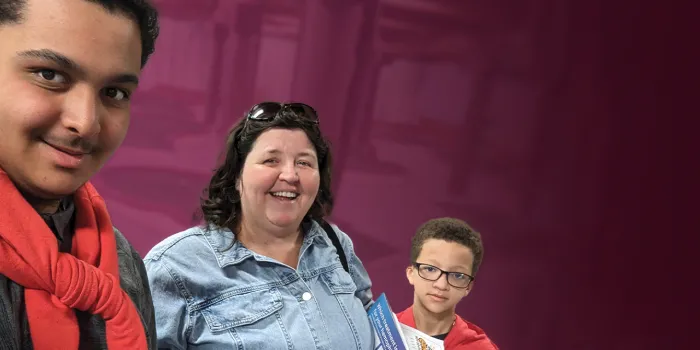After my newborn son Ethan’s circumcision, he wouldn’t stop bleeding. The doctor said it was normal and sent us home with Silvadene cream, despite my protests.
The first time I changed Ethan’s diaper at home, it was full of blood. I called the hospital and was told again that this was normal. I knew it wasn’t. Bleeding disorders run in my family: My mom was a carrier, and I was diagnosed with von Willebrand disease at age 5. So finally, after more back-and-forth, the hospital relented and allowed me to bring him back in. It came as no surprise when doctors diagnosed Ethan with hemophilia A. He ended up with a blood transfusion and was in the NICU for 46 days.
Things felt very heavy back then. I wasn’t allowed to hold my new baby, and I grieved for the time we lost together. If doctors had listened to me in the first place, things might not have escalated to that point.
Early Age Challenges
As Ethan grew, my voice grew stronger as well. Frequent nosebleeds plagued him, and because he needed factor so often, doctors implanted a port when he was about 18 months old. He spent many weeks, sometimes months, in the hospital with infections, which I blamed on the port. Yet once again, my beliefs were ignored. When he was about 4, I stopped taking no for an answer. They removed the port, and sure enough, the infections stopped.
I knew I couldn’t keep fighting alone, so I found my local chapter of the National Hemophilia Foundation (now called the National Bleeding Disorders Foundation) in Western Pennsylvania. Suddenly, I had an entire group of moms supporting me. They walked me through things, answered my questions, and formed a strong bond with me and my son.
Read More: Finding Support When You Have an Extremely Rare Blood Disorder
Before my second child, Kyrie, was born, testing revealed that he also had hemophilia A. By that time, I knew I had to demand every single thing that my kids needed. At one point in elementary school, Ethan was restricted from gym. I marched into that school and told them: “He has rights, and you have to let him participate. You’re going to treat him fairly and with respect.”
Raising Young Adult Advocates
Today, I’m so proud of my boys. From the beginning, I took them to advocacy events, like Washington Days, so they could see how important it is to take on issues that really matter. They’ve also learned to speak up for themselves. Ethan’s 18 now, and if he gets a bleed, he knows exactly what to do. Kyrie’s 9. He’s still a little needle-shy, so he doesn’t do his own infusions quite yet, but he does mix his own medicine.
I know what it felt like to be brushed off, and I didn’t want my kids to grow up like that. The more that I do, the more I realize how important it is to have a voice. I want to continue to do that for myself, my boys, and for people who can’t yet do it for themselves.

